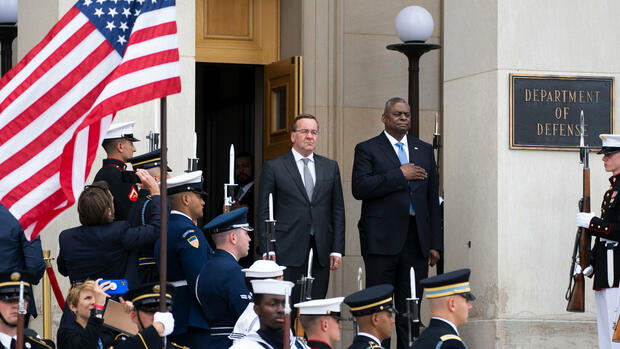Washington Federal Defense Minister Boris Pistorius has spoken out in favor of a longer term in office for NATO Secretary General Jens Stoltenberg. “If there is no majority for a candidate, then it is sensible and prudent at this time to ask the acting Secretary-General to extend it,” he said during a visit to Washington. “It will become clear in the next few days whether it will come to that.”
The Estonian Prime Minister Kaja Kallas had previously spoken out in favor of an extension. “I think that the new secretary-general will be the current one, although there are strong candidates,” she said, according to Portuguese TV channel RTP in Brussels.
Stoltenberg’s term of office normally ends in October. Danish Prime Minister Fredriksen is considered a possible successor candidate, while British Defense Minister Ben Wallace recently withdrew his candidacy.
Pistorius was in Washington for a so-called “working visit”, as such visits are called in diplomatic parlance. “We’ve been seeing each other quite a lot lately,” said US Secretary of Defense Lloyd Austin as he welcomed his guest from Germany.
Boris Pistorius (SPD) traveled to the US capital for the first time on Wednesday as Federal Minister of Defense. But both top politicians meet regularly, within the framework of the Ukraine contact group or at NATO partner level.
The Ukraine war is at a “key moment”, Austin emphasized, for several reasons: The western defense alliance is hoping for a breakthrough in the Ukrainian counter-offensive. And the attempted coup by the Russian mercenary boss Yevgeny Prigozhin against the Kremlin once again demonstrated the potential for escalation.
Pistorius used the visit to underscore Germany’s new, more proactive role in geopolitics. He gave the New York Times an extensive interview on world politics. “Germany is ready to take a more confident stance in the face of growing international instability,” Pistorius said.
The German “turning point” and the increased military commitment are positively received in Washington. “We appreciate your support in defending Ukraine,” Austin said. Pistorius announced this week that 4,000 soldiers would be sent permanently to Lithuania to strengthen NATO’s eastern flank in the face of the Russian threat.
“Post-Cold War Turning Point”
Nevertheless, one thing is clear: without the USA, Ukraine’s defense would have collapsed long ago. US President Joe Biden on Wednesday reiterated US leadership in the Western alliance in support of Ukraine. After the Wagner revolt, he called and zoomed “non-stop” with European allies.
“Everyone looks to the United States for what we decide, what we’re going to do, how we’re going to do it,” Biden said. “We are at a turning point in the post-Cold War era,” said US Secretary of State Antony Blinken. “If we don’t move forward, there are two possibilities: either no one does, or our opponents do.”
However, the dynamics of an unpredictable war have also led to conflicts in the past. When Pistorius took office almost six months ago, after the resignation of his predecessor Christine Lambrecht, the debate about the use of German Leopard tanks was smoldering. Germany had initially blocked it.
The Americans eventually agreed to provide US tanks, easing the German blockade. “The first visitor to my new office was Lloyd Austin,” Pistorius recalled in Washington.
Meanwhile, deliveries of fighter jets, long-range cruise missiles and even cluster bombs are being discussed. However, Pistorius emphasized that new weapon systems are not a priority at the moment. The focus should be more on repairing existing weapons and replenishing ammunition.
The US is still the mainstay of Ukraine’s defence, having approved US$113 billion in military and economic and humanitarian funds since the outbreak of war, followed by the EU (US$67 billion) as the second largest donor. But the longer the war goes on, the more difficult it becomes for US President Joe Biden to maintain support for his Ukraine course.
US support for Ukraine
Some Republicans in the US Congress want to block new Ukraine aid. And it’s entirely possible that in the 2024 presidential election, a Republican like Donald Trump will take power and scale back commitments to Ukraine and NATO.
“I am a child of the Cold War and I grew up trusting that the United States, at the helm of NATO, will defend our freedom and security when it matters,” Pistorius warned in Washington.
Even without Trump in the White House, the situation is already difficult. A debate is raging on Capitol Hill about how much longer US production can keep up with Ukraine’s arms race.
The NATO defense ministers are working on plans to secure Ukraine’s weapons needs in the long term without endangering its own stocks. The burden on the armaments industry should also be an issue at the NATO summit in Vilnius on July 10th and 11th.
Interestingly, Pistorius also made a German commitment in Asia the focus of the visit. The Indo-Pacific is a key target region for the US government to contain China’s military ambitions in the South China Sea.
Pistorius suggested that the Americans and Europeans could act together on this issue. “We also see a European responsibility for the Indo-Pacific region,” he said.
Pistorius recently spoke to India about facilitating the arms purchase process. “I am convinced that we should make more arms deliveries,” he told the New York Times. “That doesn’t mean that we want to flood the world with German weapons. That still has to be done with a sense of proportion.”
More: US considers supplying cluster bombs to Ukraine
